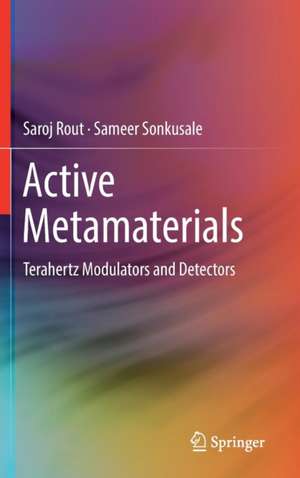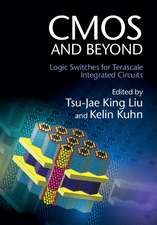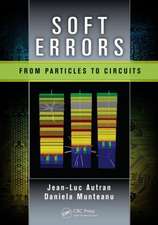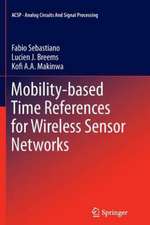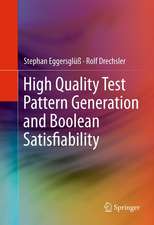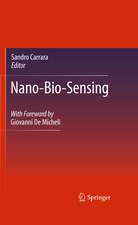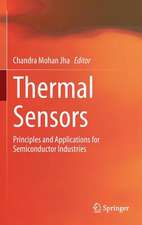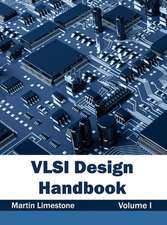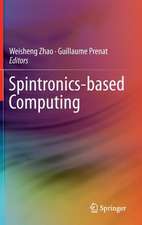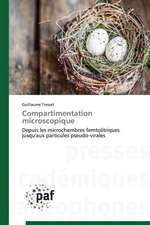Active Metamaterials: Terahertz Modulators and Detectors
Autor Saroj Rout, Sameer Sonkusaleen Limba Engleză Hardback – 14 feb 2017
| Toate formatele și edițiile | Preț | Express |
|---|---|---|
| Paperback (1) | 719.13 lei 6-8 săpt. | |
| Springer International Publishing – 13 iul 2018 | 719.13 lei 6-8 săpt. | |
| Hardback (1) | 725.13 lei 6-8 săpt. | |
| Springer International Publishing – 14 feb 2017 | 725.13 lei 6-8 săpt. |
Preț: 725.13 lei
Preț vechi: 884.30 lei
-18% Nou
Puncte Express: 1088
Preț estimativ în valută:
138.77€ • 144.34$ • 114.56£
138.77€ • 144.34$ • 114.56£
Carte tipărită la comandă
Livrare economică 14-28 aprilie
Preluare comenzi: 021 569.72.76
Specificații
ISBN-13: 9783319522180
ISBN-10: 3319522183
Pagini: 118
Ilustrații: XIII, 118 p. 67 illus., 59 illus. in color.
Dimensiuni: 155 x 235 x 10 mm
Greutate: 0.37 kg
Ediția:1st ed. 2017
Editura: Springer International Publishing
Colecția Springer
Locul publicării:Cham, Switzerland
ISBN-10: 3319522183
Pagini: 118
Ilustrații: XIII, 118 p. 67 illus., 59 illus. in color.
Dimensiuni: 155 x 235 x 10 mm
Greutate: 0.37 kg
Ediția:1st ed. 2017
Editura: Springer International Publishing
Colecția Springer
Locul publicării:Cham, Switzerland
Cuprins
Chapter 1.Introduction.- Chapter 2. Background Theory.- Chapter 3.Experimental Methods.- Chapter 4.High Speed Terahertz Modulation using Active Metamaterial.- Chapter 5. A Terahertz Spatial Light Modulator for Imaging Application.- Chapter 6.A Terahertz Focal Plane Array using Metamaterials in a CMOS Process.- A. Electromagnetic Waves.
Notă biografică
Dr. Saroj Rout received his Ph.D. in Electrical Engineering from Tufts University, Medford, Massachusetts, USA, where he worked on metamaterials for his doctoral dissertation. He received his Masters and Bachelors in engineering from Birla Institute of Technology and Science (BITS), Pilani, India. He is a passionate teacher and has taught undergraduate electrical engineering courses at Tufts University and BITS, Pilani. He is an accomplished semiconductor professional with more than 18 years of experience in research and development of more than 10 semiconductor products in the area of communication and navigation. Two of the products have sold more than 1.5 billion units to date. He is the co-inventor of 7 patents in the area of CMOS VLSI design and metamaterials.
He is the founder and principal engineer at Mixignal Innovations LLC, a VLSI circuit design consulting firm which provides turnkey solutions to semiconductor companies. He is also an adjunct professor at Silicon Institute of Technology, India, where he is developing a research center in the area of CMOS analog VLSI design.
Prof. Sameer R Sonkusale is a Professor of Electrical Engineering with a joint appointment (courtesy) of Biomedical Engineering at Tufts University. Prior to coming to Tufts, he was an Assistant Professor at Texas A&M University, College Station, Tx from 2002 to 2004. For the year 2011-2012, he was also a visiting associate professor of medicine at Harvard Medical School and Brigham and Womens Hospital. Prior to an academic career, he worked for Texas Instruments in Bangalore India from 1996-1997. Prof. Sonkusale received his MS and PhD in Electrical Engineeringfrom University of Pennsylvania under the supervision of Prof. Jan Van der Spiegel where he worked on pipeliend analog to digital converters for his doctoral dissertation. He was co-advised by Dr. K. Nagaraj from Texas Instruments and by Prof. Ken Laker at University of Pennsylvania. His undergraduate degree is in Electrical and Electronics Engineering from Birla Institute of Technology and Science (BITS Pilani), India. Prof. Sonkusale's teaching and research interests are in the area of flexible bioelectronics, biomedical micro- and nanodevices, lab-on-chip systems, nanoscale sensors, low power integrated circuits, analog to information converters, and active metamaterials for terahertz applications. His current research on "smart threads" to use engineered smart nano-infused threads for surgical sutures, wound dressings and wearable diagnsotics has been featured prominently by leading news organizations like the Wall Street Journal, Fortune Magazine, Fast Company, Inc.com, National Public Radio (WBUR), IEEE Spectrum, The Telegraph (UK) to name a few.
Prof. Sonkusale is also passionate about making low cost diagnostics for the developing world and believes strongly in the democratization of science and innovation. He serves on the board of the Science for the Public, a non-profit organization to improve public understanding of, and appreciation for, science. Prof. Sonkusale received the NSF CAREER award in 2010, the Future Trends in Microelectronics Best poster prize in 2009, and has won several best paper awards with his students at many international conferences (NANO 2008, SENSORS 2008, ISDRS2009, FTM 2009). He is a past fellow of NAE Frontiers of Engineering in 2015 and NAS Arab-US Frontiers in Science, Engineering and Medicine in 2014 and 2016. Prof. Sonkusale is currently on the editorial board of Nature Scientific Reports, IEEE Transactions on Biomedical Circuits and Systems and IET Electronics Letters. He is a past associate editor of IEEE Transactions of Circuits and Systems-1 and a past chair of CAS Biomedical and Lifesciences Technical Commitee. Prof. Sonkusale is a senior member of the IEEE, OSA, MRS and AAAS.
He is the founder and principal engineer at Mixignal Innovations LLC, a VLSI circuit design consulting firm which provides turnkey solutions to semiconductor companies. He is also an adjunct professor at Silicon Institute of Technology, India, where he is developing a research center in the area of CMOS analog VLSI design.
Prof. Sameer R Sonkusale is a Professor of Electrical Engineering with a joint appointment (courtesy) of Biomedical Engineering at Tufts University. Prior to coming to Tufts, he was an Assistant Professor at Texas A&M University, College Station, Tx from 2002 to 2004. For the year 2011-2012, he was also a visiting associate professor of medicine at Harvard Medical School and Brigham and Womens Hospital. Prior to an academic career, he worked for Texas Instruments in Bangalore India from 1996-1997. Prof. Sonkusale received his MS and PhD in Electrical Engineeringfrom University of Pennsylvania under the supervision of Prof. Jan Van der Spiegel where he worked on pipeliend analog to digital converters for his doctoral dissertation. He was co-advised by Dr. K. Nagaraj from Texas Instruments and by Prof. Ken Laker at University of Pennsylvania. His undergraduate degree is in Electrical and Electronics Engineering from Birla Institute of Technology and Science (BITS Pilani), India. Prof. Sonkusale's teaching and research interests are in the area of flexible bioelectronics, biomedical micro- and nanodevices, lab-on-chip systems, nanoscale sensors, low power integrated circuits, analog to information converters, and active metamaterials for terahertz applications. His current research on "smart threads" to use engineered smart nano-infused threads for surgical sutures, wound dressings and wearable diagnsotics has been featured prominently by leading news organizations like the Wall Street Journal, Fortune Magazine, Fast Company, Inc.com, National Public Radio (WBUR), IEEE Spectrum, The Telegraph (UK) to name a few.
Prof. Sonkusale is also passionate about making low cost diagnostics for the developing world and believes strongly in the democratization of science and innovation. He serves on the board of the Science for the Public, a non-profit organization to improve public understanding of, and appreciation for, science. Prof. Sonkusale received the NSF CAREER award in 2010, the Future Trends in Microelectronics Best poster prize in 2009, and has won several best paper awards with his students at many international conferences (NANO 2008, SENSORS 2008, ISDRS2009, FTM 2009). He is a past fellow of NAE Frontiers of Engineering in 2015 and NAS Arab-US Frontiers in Science, Engineering and Medicine in 2014 and 2016. Prof. Sonkusale is currently on the editorial board of Nature Scientific Reports, IEEE Transactions on Biomedical Circuits and Systems and IET Electronics Letters. He is a past associate editor of IEEE Transactions of Circuits and Systems-1 and a past chair of CAS Biomedical and Lifesciences Technical Commitee. Prof. Sonkusale is a senior member of the IEEE, OSA, MRS and AAAS.
Textul de pe ultima copertă
This book covers the theoretical background and experimental methods for engineers and physicist to be able to design, fabricate and characterize terahertz devices using metamaterials. Devices utilize mainstream semiconductor foundry processes to make them for communication and imaging applications. This book will provide engineers and physicists a comprehensive reference to construct such devices with general background in circuits and electromagnetics. The authors describe the design and construction of electromagnetic (EM) devices for terahertz frequencies (108-1010cycles/sec) by embedding solid state electronic devices into artificial metamaterials where each unit cell is only a fraction of the wavelength of the incident EM wave. The net effect is an electronically tunable bulk properties with effective electric (permittivity) and magnetic (permeability) that can be utilized to make novel devices to fill the terahertz gap.
Caracteristici
Provides the theoretical background of metamaterials in few easy-to-understand steps; Includes detailed methods to implement terahertz metamaterials in commercial foundry process using their design rules; Offers readers a comprehensive reference for characterizing and imaging at terahertz frequencies using THz-TDS and continuous-wave spectrometers; Covers the method and analysis of dynamic measurements in terahertz time-domain spectrometers (THz-TDS) Also includes a quantitative analysis of terahertz wave modulators using metamaterials Includes supplementary material: sn.pub/extras
